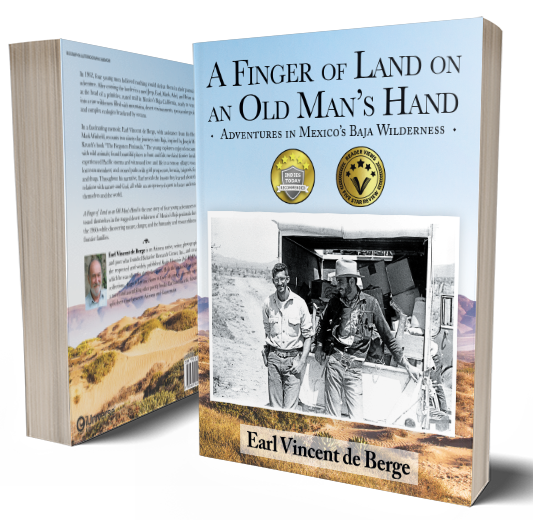FEATURED BOOK

The year was 1962. We were drawn to test ourselves in this wilderness by two books. Joseph Wood Krutch, in his 1961 book, The Forgotten Peninsula, described a wilderness that was thinly settled and rich in raw natural beauty, plant diversity, and challenge. Erle Stanley Gardner’s book Hunting the Desert Whale (1961), used short, staccato sentences to describe harsh conditions, miserable roads, virtuous frontier people, and lost civilizations documented only in cliff paintings hidden in remote canyons deep in the superheated mountains.
Our team envisaged testing our survival skills during the most challenging time—the dead of summer when midday temperatures soared above 100 degrees. Between college studies, participating in ban-the-bomb and civil rights marches and falling in love with smart women (one of whom I later married), we planned our expedición into the Sonoran Deserts on the longest peninsula on the globe.
One year after Krutch published his narrative, we stood at the head of a primitive, rutted trail. We had crowed enthusiastically, ready to forge ahead, but paused in awe at the empty desert that stretched into the distance until it vanished in a shimmering heat mirage.
At my side was Mark from Philadelphia, my college roommate and laconically humorous chum. He joined us in Mexicali after a wild bus ride from the interior of Mexico where he had been studying Spanish and working on a school-farm for orphans. He punched my shoulder and exclaimed, “Earl, I bet you think that superheated dust bowl is beautiful! Hell, let’s get going before it cools off!” From Chicago came Adel, an effervescent, fun-loving admirer of women, collector of firearms, and devotee of hunting. He brought along his sidekick, Brian, a quiet, sturdy, and likeable fellow whom I had met only a few weeks before we departed. Brian took everything in stride but always had part of his mind on his gal back home in Chicago.
During those three summer months, I was determined to indulge my emerging interest in photography, experience a desert wilderness, and live off the land. Baja became a passion of self-discovery and adventure.

